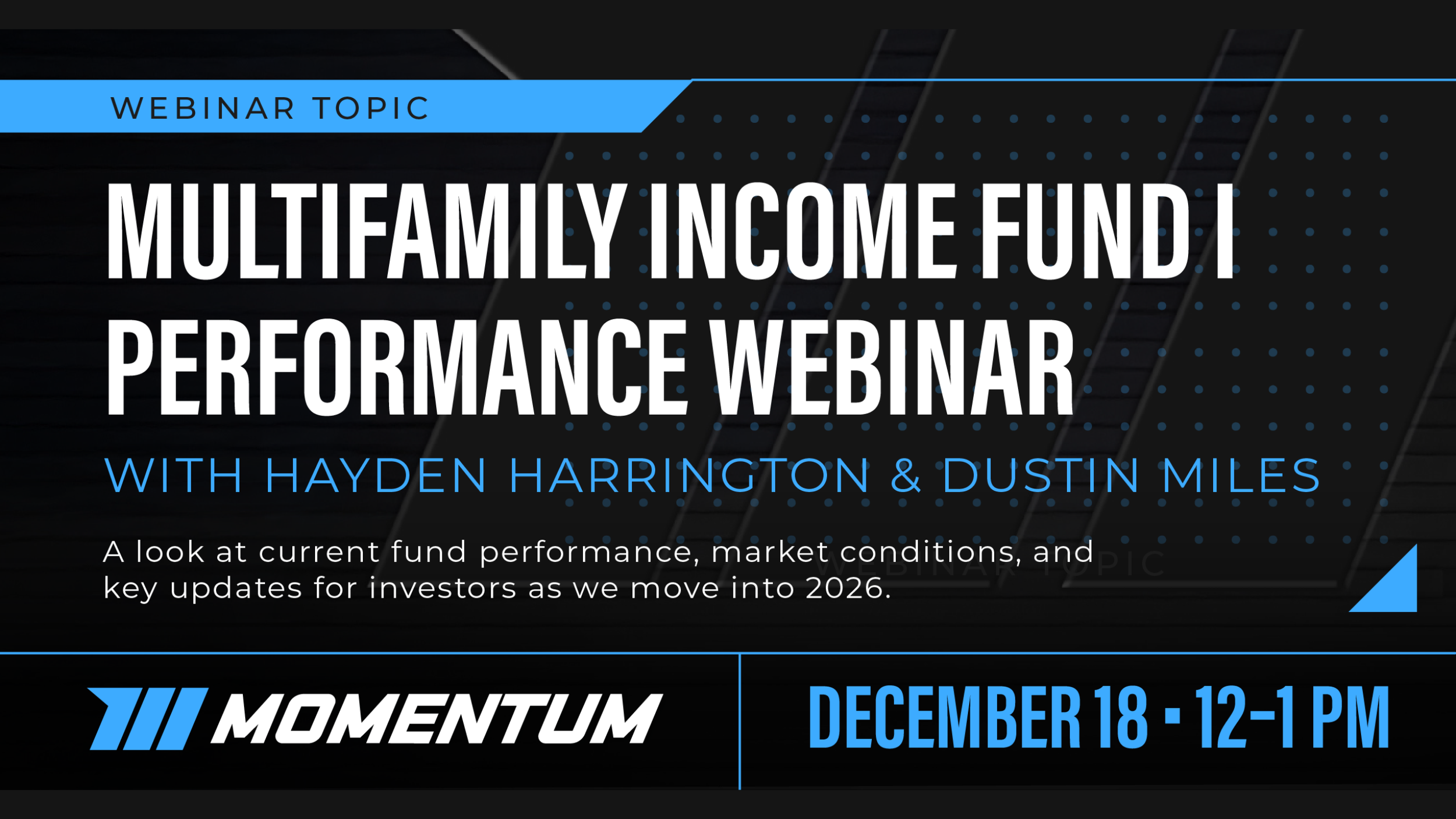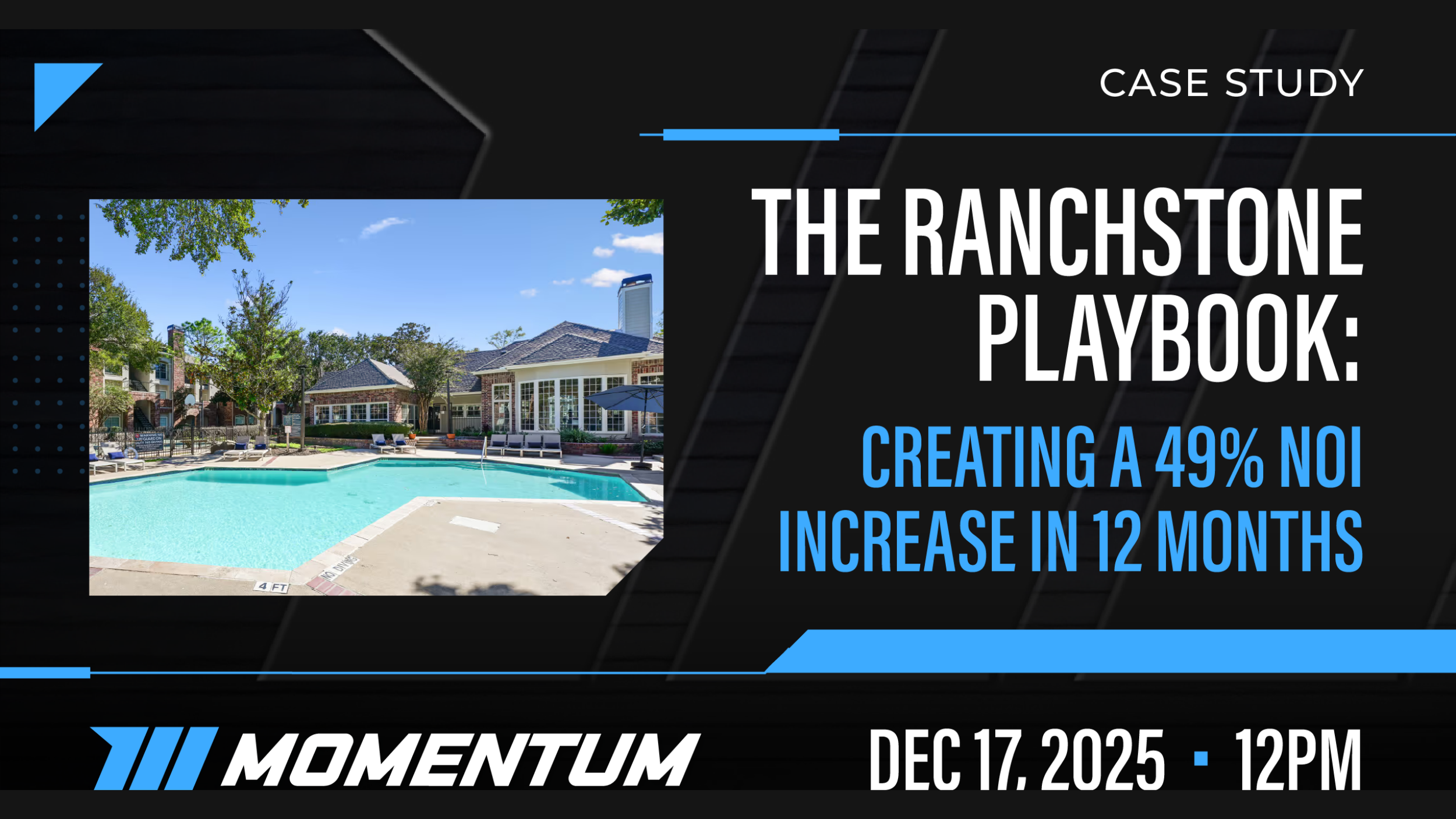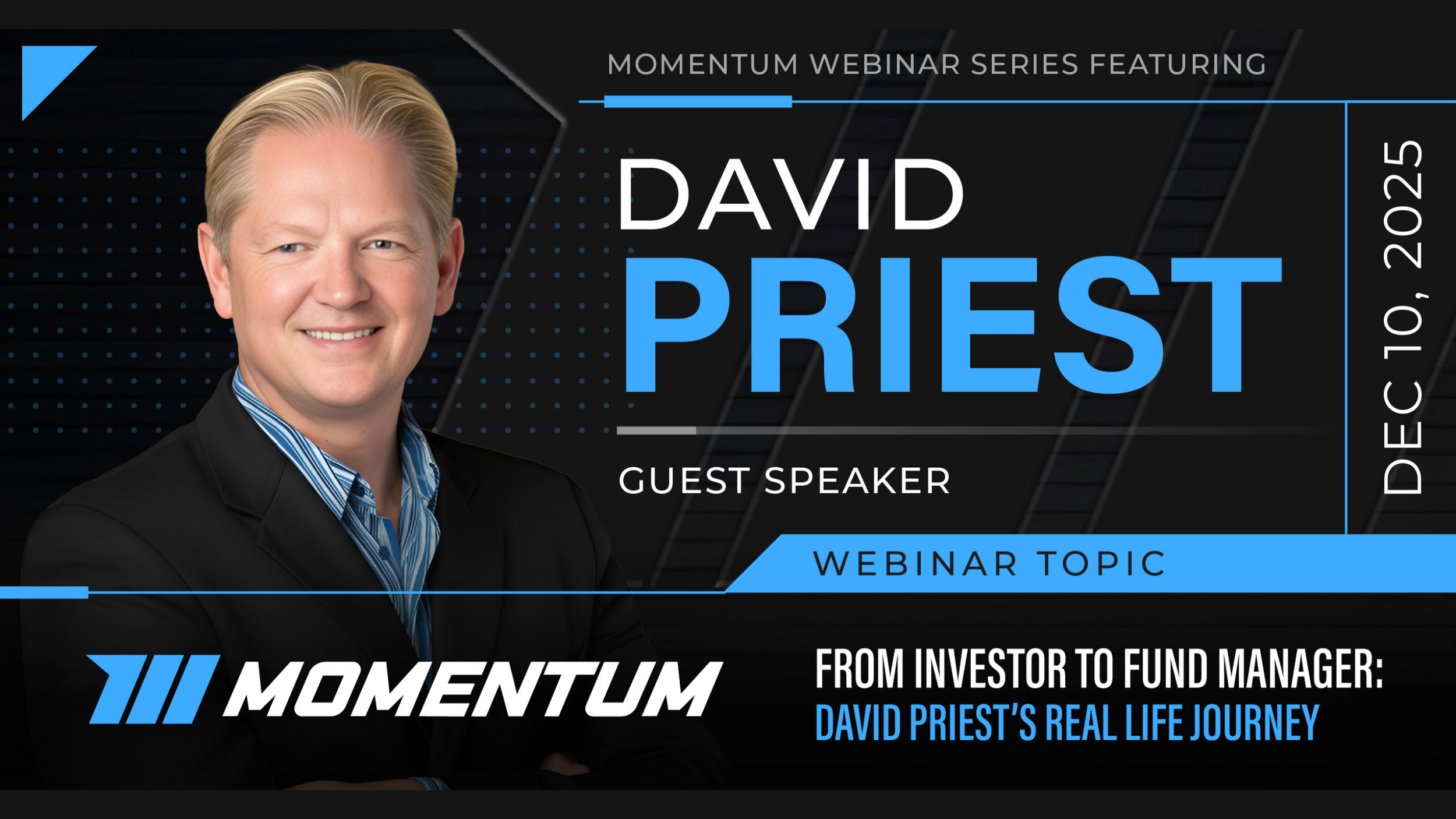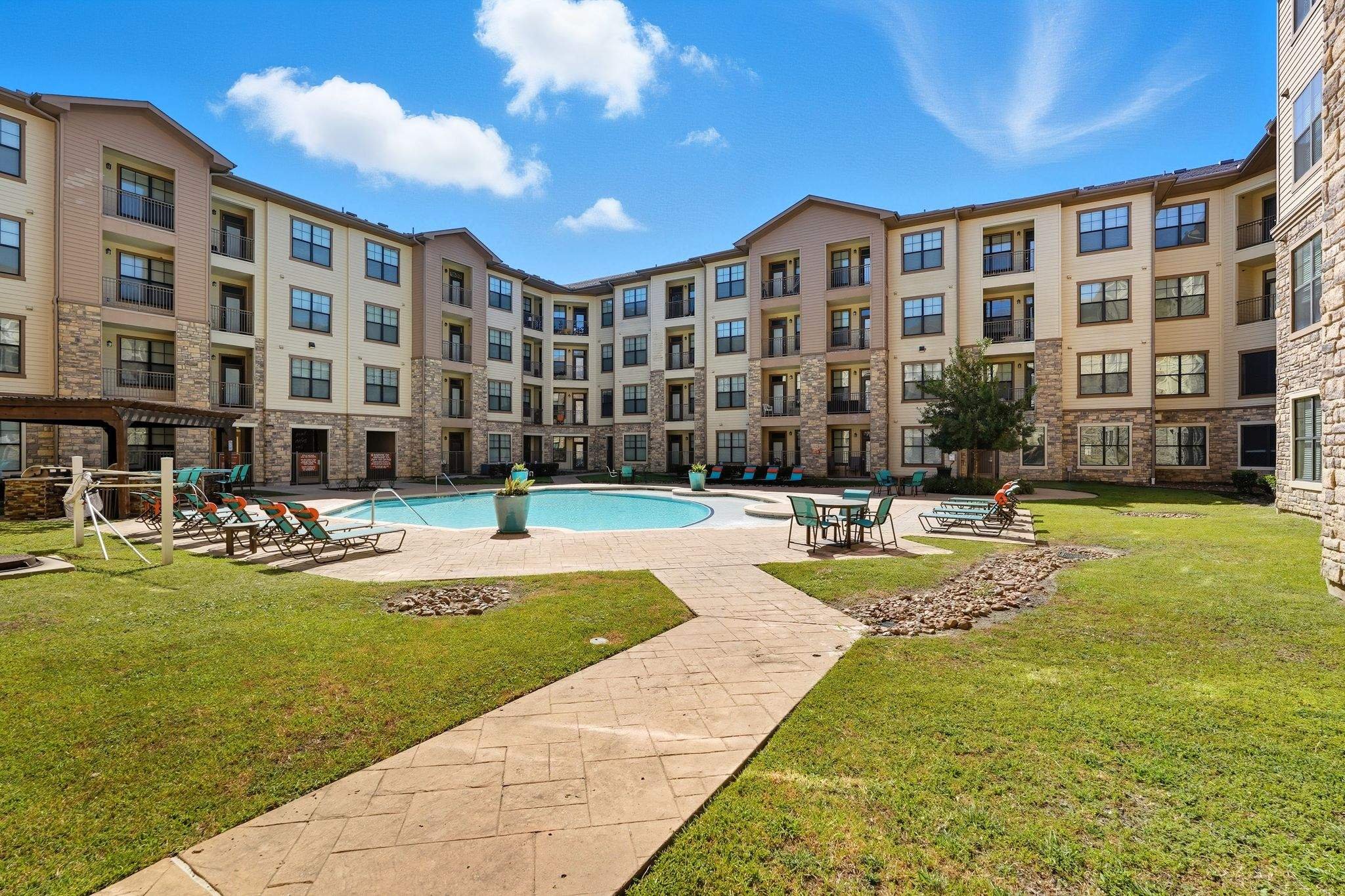
Explore recent content and education about apartment investing.
Downloadable Tools
-

Due Diligence Checklist
An essential tool you need to streamline your investment process, mitigate risks, and ensure every detail is covered.
-

Basic IRR Calculator
This free IRR Calculator is designed to help you easily assess the profitability and efficiency of your investments, so you can make more informed decisions.
-

Guide to Multifamily Metrics & Terms
Learn the crucial numbers, like NOI and Cap Rate, that experienced investors use to evaluate potential properties and assess profitability.
On The Move
“Our insights on operations and takes on broader market trends.”
Recent Articles
Explore some of our recent articles and informative webinars. We are here to be your guide to multifamily investing.
Webinar: Market Clarity 2026: Insights from Michael Becker
In a recent Momentum webinar, Michael Becker, a Dallas-based multifamily investor and operator, shared a candid assessment of today’s market and where opportunity is likely to emerge as we head into 2026. Drawing on decades of experience—and lessons from multiple market cycles—Michael offered practical guidance for navigating today’s slower, more selective investment environment.
Technology Tools Every Apartment Investor Should Be Using in 2026
The pace of innovation in multifamily real estate has never been faster. As investor expectations rise, residents demand more, and competition tightens, the right technology stack is no longer a “nice to have”—it’s a core advantage.
Whether you’re an active operator, asset manager, or passive investor evaluating opportunities, understanding the tools reshaping the industry in 2026 can dramatically improve decision-making, efficiency, and NOI. Here are the technology categories and platforms every apartment investor should be paying attention to this year.
The Psychology of Passive Investors: What Inspires Trust and Action
In private real estate—especially multifamily—capital doesn’t flow because of spreadsheets alone. Passive investors make decisions based on a complex blend of logic, emotion, risk perception, and psychological triggers that either build trust…or erode it.
Understanding what motivates passive investors is one of the greatest competitive advantages a sponsor can have. Deals don’t get funded simply because the numbers work. They get funded because investors believe in the sponsor, the vision, and the ability to protect their capital.
Here’s a deep dive into the psychology behind passive investment decisions—and how operators can align with the principles that inspire both trust and action.
Webinar: MF Income Fund I Performance Review
Today’s MF Income Fund I Webinar provided investors with a transparent, in-depth look at the fund’s performance, structure, and forward strategy. Hosted by Dustin and Hayden, the session walked through how the fund operates, the role of strategic partnerships, and how the team is positioning assets in the current market environment.
Webinar: The Ranchstone Playbook — Creating a 49% NOI Increase in 12 Months
On December 17, 2025, Momentum Multifamily hosted a comprehensive case study webinar diving into one of Houston’s hidden gems: The Henry at Ranchstone asset. Led by partners Dustin Miles and Hayden Harrington, the webinar offered an inside look at their “franchise approach” to multifamily ownership and the many lessons learned along the way.
Pros & Cons of Investing Through a Self-Directed IRA in Multifamily Deals
For many investors, retirement accounts are one of the most underutilized tools for building long-term wealth. And when it comes to private real estate—especially multifamily—self-directed IRAs (SDIRAs) have become increasingly popular as a way to access tax-advantaged passive income and diversification.
But using an SDIRA isn’t right for everyone. It comes with powerful benefits, along with strict rules and important limitations every investor should understand. Below is a clear breakdown of the pros, cons, and key considerations for using a self-directed IRA to invest in multifamily real estate.
Webinar: From Investor to Fund Manager: David Priest’s Real Life Journey
In today’s webinar, hosted by Dustin Miles, investors got a candid look at the path of David Priest—a Houston native whose career in real estate has been shaped by calculated risks, resilience, and a deep commitment to doing the right thing. His story offers timely lessons for anyone navigating the multifamily landscape in a turbulent market.
Creative Capital Stacking: Blending Debt, Equity, and Preferred Equity
In today’s real estate landscape—where interest rates remain elevated, equity is cautious, and deals are harder to pencil—successful operators are leaning heavily on one skill: creative capital stacking. The ability to strategically blend debt, equity, and preferred equity has become a defining advantage for sponsors who want to stay competitive while protecting returns.
Creative Capital Stacking: Blending Debt, Equity, and Preferred Equity
In multifamily real estate investing, access to capital is one of the most important drivers of success. But beyond simply raising funds, how you structure that capital can make or break your returns. Enter creative capital stacking — the strategic combination of debt, equity, and preferred equity to maximize both flexibility and profitability.
Understanding how to layer these different sources effectively allows sponsors to optimize leverage, protect downside, and enhance overall returns — all while keeping investors aligned and confident in the deal.
The Rise of Fund-of-Funds in Multifamily Investing
The multifamily investment landscape has evolved rapidly over the past few years. Between shifting interest rates, new investor expectations, and the growing appetite for diversification, one structure has started to gain serious traction among both passive investors and operators alike — the Fund-of-Funds model.
This approach, once reserved for institutional capital, is now becoming a powerful tool for experienced sponsors and wealth builders looking to scale strategically.
So, what exactly is driving this rise — and what should investors know before getting involved?
How to Build Long-Term Relationships With Passive Investors
In the world of real estate investing, capital may open the door — but relationships keep it open. For sponsors and operators, success isn’t just about finding investors; it’s about cultivating long-term trust with the people who choose to invest alongside you.
Whether you’re raising for your first syndication or managing a portfolio of stabilized assets, your ability to build and nurture investor relationships will define the longevity and growth of your business.
How Rent Control Policies Affect Apartment Investments (and How to Adapt)
Rent control has long been one of the most debated topics in multifamily real estate. For investors, operators, and developers alike, these policies can dramatically shape market dynamics — influencing everything from underwriting assumptions to long-term asset performance. Understanding how rent control impacts investments — and how to adapt — is essential for staying competitive in today’s changing housing landscape.
Webinar Recap: Raise Capital Like a Pro: Sales-Based Strategies for Authentic Investor Conversations
In the world of investment and capital raising, there’s no magic formula for success — but there are strategies that can dramatically improve your results.
During our recent webinar with Keeley Hubbard, a serial sales professional with over 18 years of experience in high-ticket sales and capital raising, she shared practical and mindset-shifting strategies that redefine how to build lasting investor relationships.
Wicked Good Networking Meetup Recap - 10.29.25
Last week’s Wicked Good Networking meetup was a spooktacular success! 👻
We teamed up with Nick DiLeone of Leone Real Estate Partners and The Real Estate Ladies — Diana Lin, Esther Cho, and Divya Smith — to host an unforgettable night of connection and community.
How Demographic Shifts Are Reshaping Apartment Demand
The multifamily real estate landscape is constantly evolving, and one of the biggest forces driving change today is demographics. Shifts in population size, age, lifestyle preferences, and household composition are influencing the types of apartments in demand, where they’re needed, and what amenities renters prioritize. For multifamily investors, understanding these trends is critical for making informed decisions and capturing opportunities in a competitive market.
Understanding the Impact of Job Growth & Migration on Multifamily Investments
In the world of multifamily real estate investing, location has always been a key driver of success. But it’s not just about the physical attributes of a property—it’s about who lives there, why they’re there, and how that population is changing over time. Two critical factors that can significantly impact multifamily performance are job growth and migration patterns. Understanding these forces can help investors make smarter acquisition decisions, identify emerging markets, and maximize returns.
Emerging Secondary Markets: Where Investors Are Finding Opportunity Beyond the Big Cities
In the world of real estate investing, major metropolitan areas like New York, Los Angeles, and San Francisco have long been seen as the holy grail of opportunity. But in recent years, savvy investors are increasingly turning their attention to emerging secondary markets—cities and regions just outside the traditional hotspots that are offering strong growth potential, lower entry costs, and attractive long-term returns.
Multifamily vs. Build-to-Rent Communities: What Investors Need to Know
In today’s shifting housing landscape, two asset classes continue to capture investors’ attention: traditional multifamily apartments and the rapidly growing build-to-rent (BTR) community segment. Both models cater to the increasing demand for quality rental housing—but they serve different renter demographics, operate under different fundamentals, and offer unique investment advantages.
Here’s a breakdown of what investors need to know before deciding where to place their capital.
Recap: The Broker Breakdown - September Meetup
At our latest Momentum Multifamily networking meetup, we hosted a Broker Panel featuring Jared Rice, Chris Pearson, and Cameron Purse—three experts actively shaping today’s multifamily landscape.
The Role of a Property Manager in a Successful Apartment Investment
When it comes to apartment investing, most people focus on the front end of the process: finding the right property, raising capital, and securing financing. But what often separates a successful investment from a mediocre one isn’t just the acquisition—it’s the execution. And at the center of that execution is the property manager.
A skilled property manager can make the difference between a thriving community that consistently delivers returns and a property that underperforms. Here’s why property management plays such a critical role in multifamily success.

Sign up to get access now.
Ready to take action? Get started today.






















